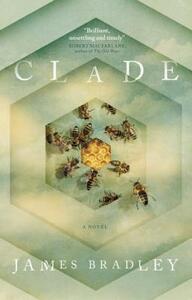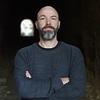Take a photo of a barcode or cover
Clade is definitely one of the stand out books I've read this year. It was short, it was punchy and above all not preachy.
I was grateful for the way Bradley handled the topic of climate change and the Earth's environment; all the future scientific and technological advancements. It is not painted as a big, fat disaster that man kind won't be able to handle. It is just a constant change over the course of these characters lives which to me is much more realistic, and a lot less terrifying.
The ending for me was so very poignant. It leaves you with the most wonderful and peaceful image inside your head - I haven't forgotten it yet.
Loved it.
I was grateful for the way Bradley handled the topic of climate change and the Earth's environment; all the future scientific and technological advancements. It is not painted as a big, fat disaster that man kind won't be able to handle. It is just a constant change over the course of these characters lives which to me is much more realistic, and a lot less terrifying.
The ending for me was so very poignant. It leaves you with the most wonderful and peaceful image inside your head - I haven't forgotten it yet.
Loved it.
Insufficient bees. If a book has bees on its jacket it ought to have bees on its insides too, a lot more than this had. Otherwise it was fine.
An enjoyable mosaic novel depicting the effects of global climate change on multiple generations of a single family. This attention to the long view keeps the novel from sliding into dystopic or apocalyptic fiction.
Devastating and hopeful, thoughtful and thought-provoking, beautiful, poignant, and mesmerising in places. All in around 250 pages. Quite a remarkable achievement. This is a climate change study, following one family through several generations as the earth declines, but the book is neither depressing nor preachy. Though it really should be taken as a warning.
I have mixed feelings on this. The writing was well-done, but each part features a different character, and I didn't feel that I got a chance to really know or understand any of them, and the character switches took up so much of the book that the plot was all but nonexistent. This book clearly fights for environmental awareness, which I like, and I don't feel it's a topic that features strongly enough in many dystopian novels. Overall, it felt a bit like Normal People by Sally Rooney, in that it explores a concept through a kind of literary fiction lense, and it does this well enough that it doesn't really matter that there's no plot. I'm not entirely sure what role the characters had to play in this, but I enjoyed the writing enough that I'm willing to give this author another chance.
Clade was a cover pick for me. The gorgeous design called out to me but after reading the back it didn't seem like something I'd enjoy. I passed over it during two trips to the library but eventually caved on my third visit.
Released in 2015, Clade is an alarmingly real climate change narrative. The book opens with scientist Adam Leith witnessing the too-fast melting of glaciers in the Artic whilst contemplating his wife's attempts to conceive.
Each chapter moves forward in time and featured a different protagonist who is somehow connected to the one in the previous chapter. Though the same characters don't feature in every part,Bradley has done a fantastic job at making their motives and emotions believable - and better - relatable. The separate chapters and characters served the narrative beautifully.
I ultimately found this to be an enjoyable and emotionally-charged romp through a version of the world we may soon be living through.
Released in 2015, Clade is an alarmingly real climate change narrative. The book opens with scientist Adam Leith witnessing the too-fast melting of glaciers in the Artic whilst contemplating his wife's attempts to conceive.
Each chapter moves forward in time and featured a different protagonist who is somehow connected to the one in the previous chapter. Though the same characters don't feature in every part,Bradley has done a fantastic job at making their motives and emotions believable - and better - relatable. The separate chapters and characters served the narrative beautifully.
I ultimately found this to be an enjoyable and emotionally-charged romp through a version of the world we may soon be living through.
Clade opens during the solstice. Adam Leith, a scientist, is on an exploration to the Antarctic, trying to understand what happened to the earth during past periods of warming in order to help address present day global warming. He receives a call from his wife, Ellie, telling him that after two years of trying they are finally going to have a baby. According to Wikipedia, a clade is "a life-form group consisting of an ancestor and all its descendants." Clade the novel follows the tale of Adam's family over the next four generations as climate change triggers events that have catastrophic impacts for the human race.
I am finding it hard to describe the novel without giving too much away. Narratively, Clade works like a spinning wheel turning through time that stops every now and again to show a brief moment in the life of one of its characters: Adam and Ellie's daughter Summer as a toddler then as a child then as a teenager; her son; his family. Due to this fragmentation, it's not the kind of book where one forms a close relationship with a character and follows their story to its end. Rather, we are offered moments in the lives of a number of characters who are part of the same clade and I found the effect of that on me was to care for a family rather than an individual, much like I did in Jennifer Egan's A Visit from the Goon Squad. It is beautiful written and exquisitely sad. It shows a future of sadness, hardship and death yet in which life continues; not life as we know it, but a remarkable and incredible persistence of being.
I really enjoyed this book. Five stars.
I am finding it hard to describe the novel without giving too much away. Narratively, Clade works like a spinning wheel turning through time that stops every now and again to show a brief moment in the life of one of its characters: Adam and Ellie's daughter Summer as a toddler then as a child then as a teenager; her son; his family. Due to this fragmentation, it's not the kind of book where one forms a close relationship with a character and follows their story to its end. Rather, we are offered moments in the lives of a number of characters who are part of the same clade and I found the effect of that on me was to care for a family rather than an individual, much like I did in Jennifer Egan's A Visit from the Goon Squad. It is beautiful written and exquisitely sad. It shows a future of sadness, hardship and death yet in which life continues; not life as we know it, but a remarkable and incredible persistence of being.
I really enjoyed this book. Five stars.






